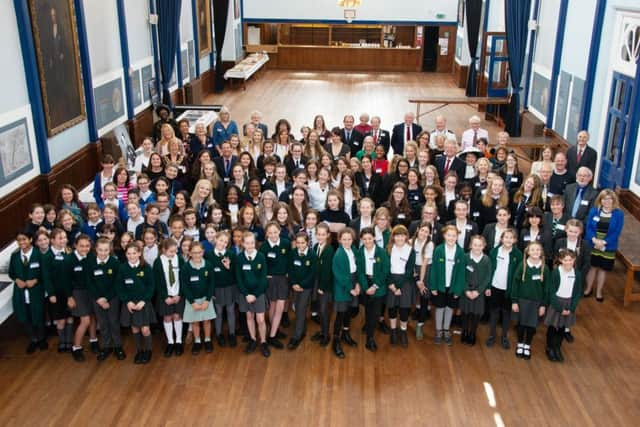Girl talk proves inspirational in Lewes


The Girls for Change event was the brainchild of the Mayor of Lewes, Cllr Janet Baah, who is on a mission to make sure that every girl gets her best chance to develop and shine. Born in Ghana, she is the town’s first ever mayor from an ethnic minority, and only the 12th woman to hold the role.
Cllr Baah invited every local school to send 10 girls. They were aged from nine to 17 and were accompanied by a teacher. For an hour, they sat at tables and talked animatedly about the changes they thought would improve the lives of girls and young women, and what they could do to help bring about those changes.
Advertisement
Hide AdAdvertisement
Hide AdThese ideas were all scribbled down on paper tablecloths, and then the girls at each table chose one idea that they thought was most important to present to the bigger group. Their hopes included more action on women’s jobs, equal pay and equal opportunities; girls having more access to different sports and to schools having mixed teams; cutting taxes on sanitary products or even making them free to all girls and women; an end to stereotyping - for instance stop clothes for girls always being pink; measures to make it safe for women walking down the street, girls being more confident to say what they think and to be able deal with harassment and bullying; and of course, very importantly, tackling climate change.
The mayor had invited Peter Field, the Lord Lieutenant of East Sussex, to open the event, and Violet Hancock, the High Sheriff of East Sussex, to close it. Baroness Grender, Baroness Whitaker, Maria Caulfield MP and Stephen Lloyd MP, the Mayor of Eastbourne and Chair of Lewes District Council, and many local councillors were joined by other supporters of the girls such as the Chief Constable of East Sussex, Professor Richard Jolly and Professor Gillian Hampden-Thompson as well as Karen Dobres of Lewes Equality Football Club.
After lunch, these guests were invited to choose one of the girls’ wishes that they feel strongly about and say what they could do to help them achieve their aspirations and make changes for girls.
Jane Foot, who designed and chaired the day, said: “Our aim was to give the girls and young women in the town the chance to share their ideas about what needs to change, and to have their voices heard by the adults who have power to make things happen. From what we saw, there is a lot of energy and enthusiasm in the town the girls can be proud of.”
Advertisement
Hide AdAdvertisement
Hide AdCllr Baah said: “The girls were focused, attentive, enthusiastic, and articulate. We have very confident girls who are ready to make very positive changes in their and others’ lives.
“We look forward to seeing them in 10 years time to share their aspirations and hopes. They made us very proud.”
Grace Nichols, the Lewes poet, read two of her poems to inspire the group and to start off the afternoon.
A highlight of the day was the mayor’s unveiling of the Suffragette banner, made by local artist Heather Downie for the Reeves Archive Suffragette exhibition celebrating 100 years since the first women got the vote. The Friends of Lewes generously paid for it to be expertly framed and Lewes Town Council has now put it on permanent display in the Corn Exchange.
Advertisement
Hide AdAdvertisement
Hide AdAt the end of the afternoon, all the girls were invited to write down their personal hopes and dreams and seal them in an envelope, which they put in a specially prepared wooden box that will be sealed for 10 years until the 2028 centenary celebrations of all women finally getting the vote. They will be invited back to witness the unsealing of the box and to see what they dreamed of and how much progress has been made.
The event was organised by local volunteers in conjunction with the Edward Reeves Archive Project, led by Brigitte Lardinois of the London College of Communication, UAL. They use the world’s oldest photographic archive to connect residents and the young people of the town to their history, through their popular lightbox exhibitions in the streets of Lewes and associated events.
Two years ago their Lewes Remembers event involving all the local bonfire societies had 238 young men marching with lit torches for all those named on the War Memorial for the First World War. The Edward Reeves Archive Project works in close partnership with Lewes Town Council and the continuing support of its staff means that events such as the Girls for Change or Lewes Remembers can be successfully put on.